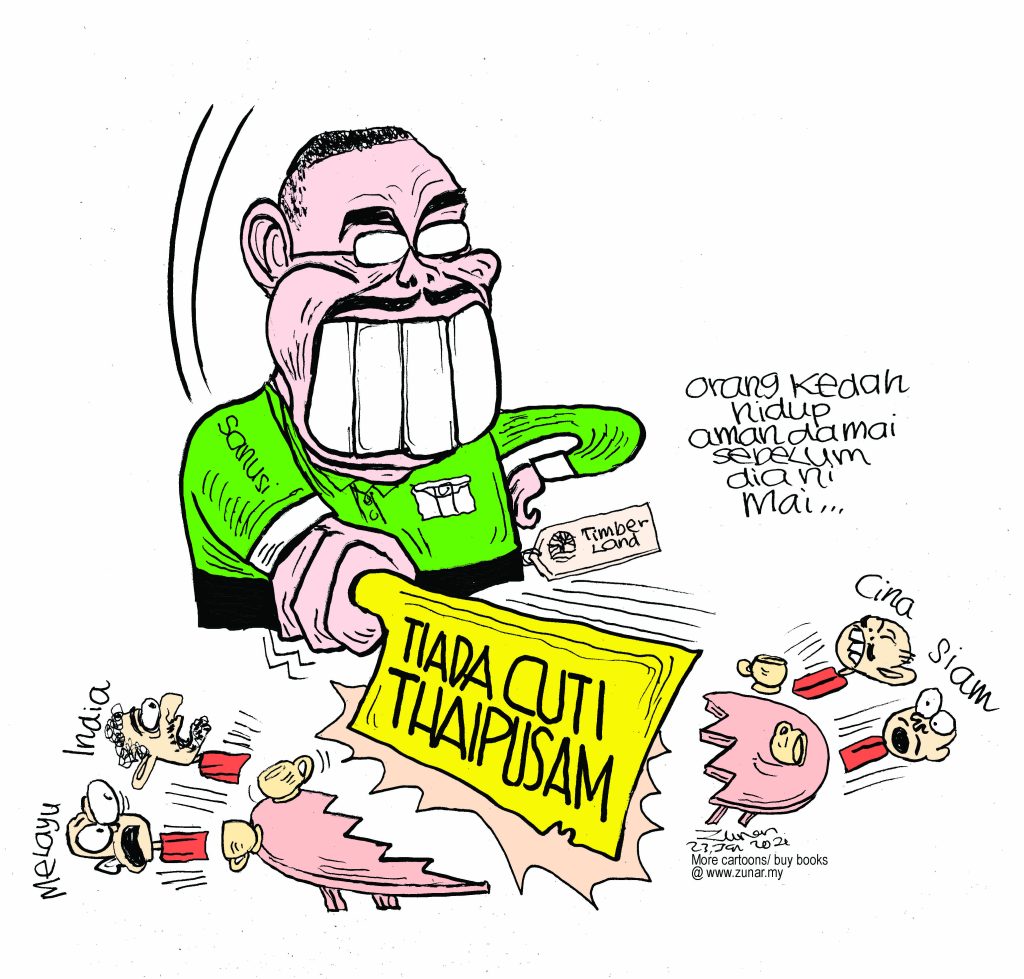
Mode of expression: Cartoon(s)
Publication: Various books
Region: Malyasia
Relevant dates: 2010 – 2020
Outcome: All charges dropped
Judicial body: Malaysian Home Ministry
Type of law: Criminal law
Themes: Sedition/Satire
Context and legal case
Zulkiflee bin SM Anwar Ulhaque (born 15 May 1962), better known by his pen name Zunar, is a renowned political cartoonist from Malaysia. Until 2018, he was facing nine charges under the archaic Sedition Act from 1948, was subject to a travel ban and was facing up to 43 years of imprisonment. Five of his cartoon books had been banned by the previous Malaysian government on the ground that their content was “detrimental to public order.” These charges were later dropped following the change of government.
On 24 June 2010, the Malaysian Home Ministry banned and prohibited from public sale 1 Funny Malaysia, a book of his published works from the online newsite Malaysiakini, and Gedung Kartun, Perak Dalam Kartun and Isu Dalam Kartun, a series of magazines about political issues in Malaysia and Perak published by his company Sepakat Efektif Sdn. Bhd. . On 24 September 2010, Zunar was arrested by the police and charged with sedition, three hours prior to the launch of his just-published book Cartoon-O-Phobia. He was jailed for one day. On 10 February 2016, he was arrested again, this time at his home in Kuala Lumpur, and detained for three days without charge. He was later charged in relation to nine political images he had posted online. Five of his books were also banned on the grounds that their contents were “detrimental to public order”. On 25 November 2016, Zunar was forced to call off his exhibition in Penang, due to a raid by pro-government advocates. The following day, Zunar was arrested, detained and investigated under two laws: the Sedition Act and the Penal Code. In 2016, a travel ban was instituted against Zunar, making it impossible for him to leave the country.
In 2018, the ruling party, Barisan Nasional, lost the general elections and Prime Minister Najib Razak faced legal charges related to the so-called 1MDB scandal. The charges focused on Najib’s role in diverting an estimated 42 million ringgit ($9.88m) from SRC International, a unit of 1MDB, into his personal bank accounts. He was found guilty in 2020.
After the change of government, Malaysian authorities acquitted and dropped all charges against Zunar.
Analysis
The case of Zunar is an example of a politician being personally targeted by a cartoonist and fighting back with archaic laws at his disposal. Zunar’s main target in many of his cartoons was Prime Minister Najib Razak and his wife Rosmah Mansor. Mansor was fond of shopping and accruing luxury; Mansor often figured in Zunar’s cartoons, most depicted with a huge, oversized diamond ring on her finger.
The case is reminiscent of the harassment and threats faced by the cartoonist Pedro X. Molina in Nicaragua by Daniel Ortega. Instead of legal actions, these threats turned physical, with a raid on El Confidencial (the news outlet that Molina published with) and a death threat painted on his front door, forcing him and his family into exile in the United States. But the similarities can be found in the way Molina mocked Ortega and also Ortega’s wife, who, in Molina’s perspective, was more cruel and bloodthirsty than Ortega himself.
One could argue that personal attacks on leaders, mocking their lavish lifestyles, is a trigger that will quickly provoke anger, because it directly targets the integrity of the leader, who often claims to be in power for the good of the common people.
The case also shows the damage that can be done by archaic and obsolete laws when employed as a tool for oppression and intimidation.
